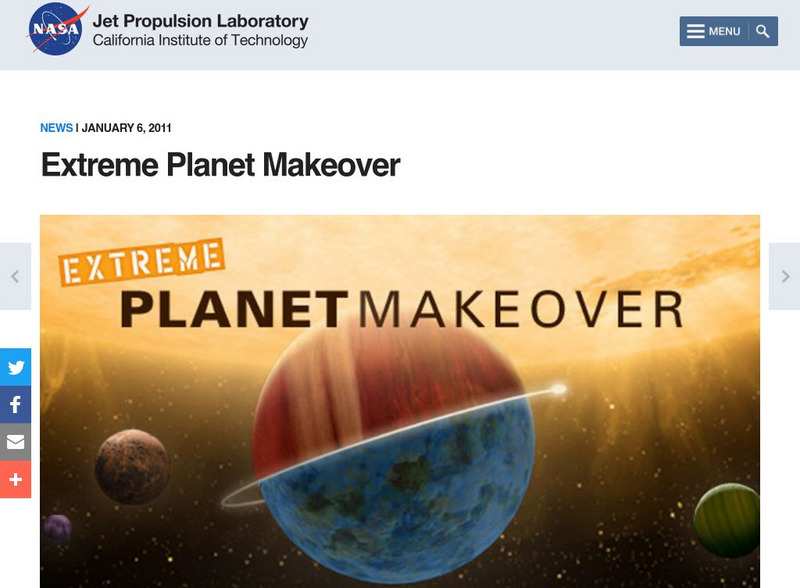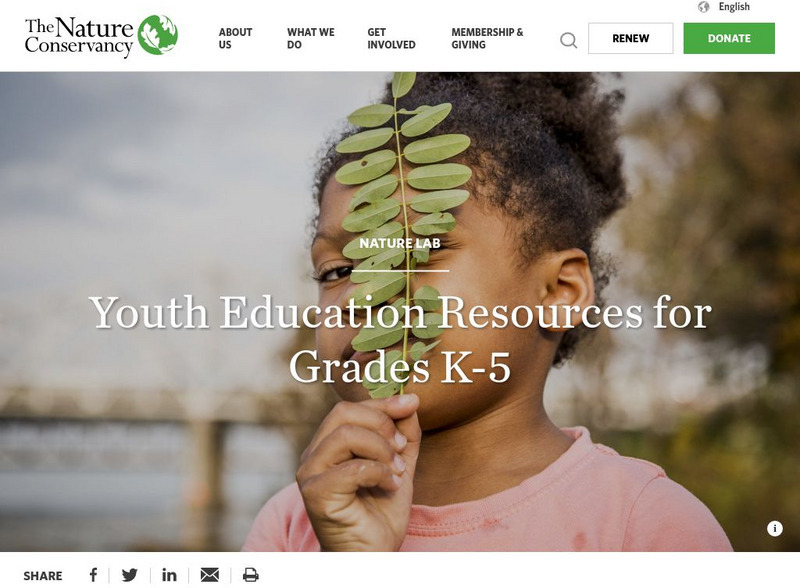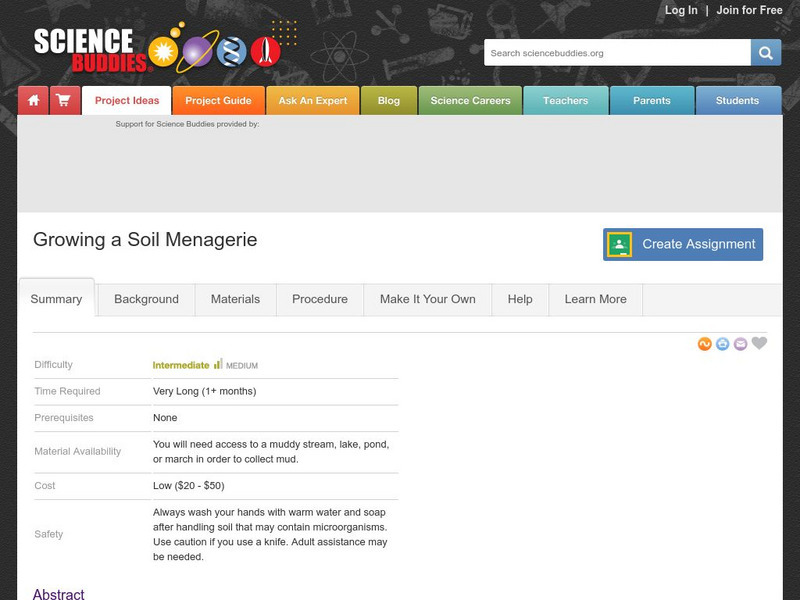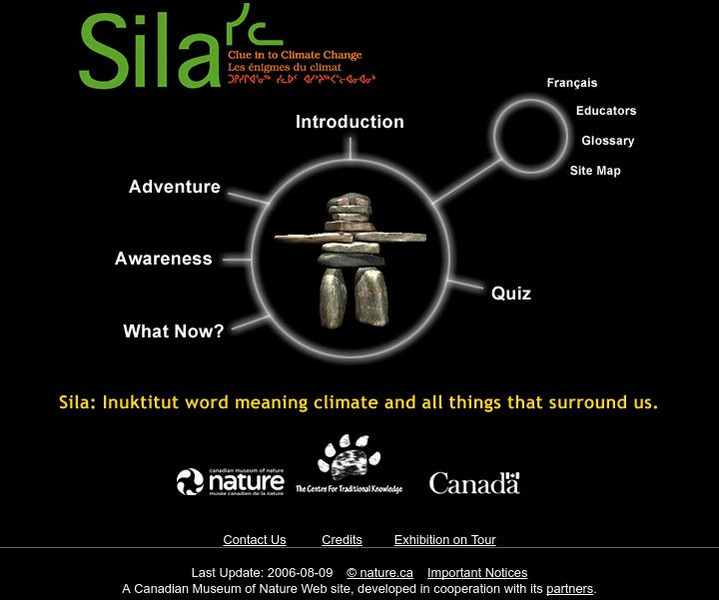Hi, what do you want to do?
Curated OER
Ocean Careers Investigation
Students gather information about different careers of the Ocean Adventures expedition team. In this career studies lesson students work in groups, read an interview with an Ocean Adventurer, and see the importance of working in a...
Curated OER
Is Climate Change Really Happening?
Students explore the impact of global warming. In this oceanography instructional activity, students investigate global climate change and write reaction papers about their research findings.
Curated OER
Why Is Evolution Controversial?
Students explore why evolution has always been a controversial topic. They use scientific process to determine patterns and to critically analyze alternative explanations for natural phenomena.
Curated OER
EVOLUTION OF BIOTECHNOLOGY
Students create a project using a provided "Evolution of Biotechnology Timeline". Students may pick from many different ideas in order to find a project that interests them. They examine how the use of biotechnology has increased with...
Curated OER
Flight Direction
Learners are introduced to NASA's Connect Series and Flight Direction programs. They explore the world of aeronautics and their missions. Students receive a front role set to the concepts and skills involved with the various NASA programs.
Curated OER
Air Pollution Over Where?
Students predict the movement of an air borne pollutant using their understanding of air currents. They determine which governments and/or communities should be contacted to be forewarned. They also explore the properties of their...
Curated OER
All Washed Up
Fourth graders simulate filtration of water containing contaminates to determine how nature cleans water. They make predictions, report observations, and construct reasonable explanations concerning their outcomes. then connect this to...
Curated OER
Is It Hot in the Light?
Third graders make observations about the temperature of items in direct sunlight. In groups, they discuss why asphalt, brick and cement are warmer than items surrounding them. To end the lesson, they examine how heat transfers energy...
Curated OER
Teacher's Guide For: Water Temperature and Salinity Experiment
Young scholars experiment with water density, temperature and salinity. In this water lesson, students observe how the coldest water sinks to the bottom of a test tube, and how saltwater sinks in comparison to freshwater.
Curated OER
Planetary Landers
Students watch programs from a series titled "Planetary Landers". As a class, they view a poster of various vehicles that have made their way into space. In groups, they brainstorm the characteristics that should be included when...
Curated OER
Got Biodiversity?
Students examine the concept of biodiversity. Using the internet, they complete small activities in which they work together. Using the information they collected, they create a class book, make murals and write in their journals.
American Institute of Biological Sciences
Action Bioscience: Life From Space: An Emerging Paradigm
Recognize that some people believe that life on Earth came from outer space. Learn about the support for these ideas and what could happen if life would continue to arrive from space.
PBS
Pbs: Origins: Where Are the Aliens?
Was there ever life on another planet? Could there be life on another planet again? What makes the Earth support life? This article investigates these questions in depth.
NASA
Nasa: Planet Quest: Extreme Planet Makeover
Activity in which students create a planet based on distance from a star, age, size, and star type. The created planet is evaluated to determine if it can support life.
Nature Conservancy
The Nature Conservancy: Gardens Activity Guide: Soil
For this lesson students conduct a soil analysis to understand soil types and explore the relationship between the garden and healthy, fertile soil. Soil is a natural resource that is crucial to life on Earth and when managed properly,...
Science Buddies
Science Buddies: Growing a Soil Menagerie
Everything on our planet is linked by a giant recycling system called the biogeochemical cycle. How our planet recycles and reuses everything we need to support life is explained by making a miniature biosphere in this lab. You will also...
NASA
Nasa: Jet Propulsion Laboratory: Planet Quest: Exoplanet Exploration
Constellation of articles, images, diagrams, posters, videos, and more on the subject of the search for planets, particularly Earth-like planets, outside our solar system.
Earth Life
Earth Life: Locomotion of Mammals
Good site for some general information on the movement of mammals. Gives a description and gives the average speed of a variety of animals.
Canadian Museum of Nature
Canadian Museum of Nature: Sila: Clue Into Climate Change
The Arctic is where climate is changing at a faster pace than any other place in the world. Explore Water, Earth, Fire, and Air to investigate the basic elements that support all life and learn about the impact climate change is having...
Science Buddies
Science Buddies: Get Down and Dirty: How Does Soil Change With Depth?
What covers less than 10% of the Earth's surface, yet is a vital natural resource for terrestrial life? What filters ground water and supports most of our food production, not to mention the production of building materials and paper?...
Other
Carbon 14 Dating
Seven pages all about Carbon 14 Dating. Information on half-life, Carbon 14 used to date specimens and artifacts, limitations, charts and graphs. Michael E. Brown Ph.D. contests that the limitations of Carbon 14 dating support the theory...

























